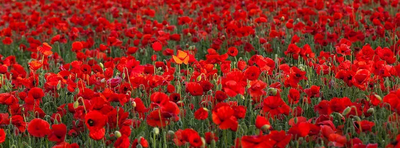The Act of Remembrance

As Remembrance Sunday draws closer our thoughts turn to how we should remember those who served and those who fell. Attending Remembrance services and parades has become very popular again after many years of decline. Albeit this year there will only be televised or streamed services as a new period of lockdown beckons. Wearing a poppy - a simple act of commemoration created by Anna Guerin and promoted by the Royal British legion - has been consistently popular since the first Poppy Appeal in 1921. Sadly, in recent times whether to wear one or not, which colour it should (or shouldn't) be and how big it should be has somewhat overshadowed the act of remembrance itself. You can get Poppies to go on your car, Poppy bunting, a range of Poppy themed gifts and much more besides - there is almost no limit to how you can remember.
I don't go much for bunting. I go to services sometimes, but not always. I wear a poppy (red, small) sometimes, but not always. All that said, on Remembrance Day I always think on these four stories:
My Grandad Jim served in the RAF in India during World War Two. He was a Fitter and spent his war recovering crashed planes. He kept a pet mongoose called 'Riki' while he was in India - it slept under his bunk. Jim was never bitten by a snake or stung by a scorpion - but Riki got pretty fat. On returning home he started a garage business in York. He was a genuinely gifted mechanic and spent so long working on engines that the palms of his hands were permanently black from ingrained sump oil. He left us in 1996.
My Great Uncle Vic served in the Army Service Corp (Remounts) in World War One. Having grown up on a farm, and familiar with taking care of horses - he would spend his war at the Remounts receiving station at Ellesmere Port. During the war Britain used several million horses and mules. Most of these were imported - Ellesmere Port was the receiving station for animals coming from the USA & Canada. After the war he returned to farming in Cumbria - becoming the first farmer in the area to own a tractor (perhaps he had seen too much of horses) - he would go on to become a Methodist lay preacher and a local councillor. He left us in 1982.
My Great Uncle John was just 16 when the Great War broke out. He joined the Loyal North Lancashire Regiment on 13th June 1918 and after completing basic training he arrived in France on 15th October of that year. Nine days later on 24th October he was killed in action. He was 20 years old. The Great War ended on 11th November. He left his savings to his little sister Annie, a few years later she used the money to emigrate to Australia. She started what would become a prosperous sheep station near Perth, with her husband Doug. John is buried at Le Cateau, France.
My Great Grandad Tommy joined the Lancashire Fusiliers (Salford Pals) soon after the First World War broke out - leaving his wife and four small children behind. On 6th June 1916 the Salford Pals moved into the front line, charged with attacking the village of Ovilliers as part of the Somme offensive. On 9th June he was reported missing. He was never found. My Great Grandma was convinced until the day she died that he had simply lost his memory - and that if she could just get to France - she would find him and bring him home. She never got to France. She died in 1966. Tommy is commemorated on the Thiepval Monument, France.
How you chose to remember is maybe not the most important thing - and it is completely up to you how you chose to do it. Watch a service, don't watch. Wear a poppy, don't wear one. Poppy bunting, no bunting.
The important thing is that you do remember. Remember - and tell others what you remember. That way those who served and those who fell are never forgotten.
For details of the national two minutes silence, click here
To donate to the 2020 Poppy Appeal and support service men and women past and present. click here
